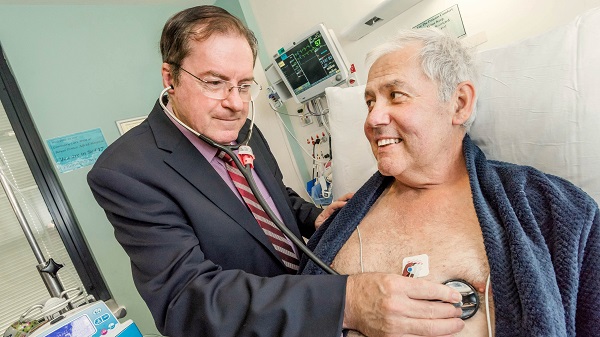How one researcher is changing how we conduct clinical trials
As a young cardiologist, Professor Anthony Keech could hardly keep up with the demand for angiograms. Coronary heart disease was devastating his local community, and surgeons couldn’t operate quickly enough.
“We ended up in a situation all around Australia in the late 1980s where patients on the waiting list for heart surgery would not survive to reach their operation date, which sometimes would be more than a year away,” he recalls.

Things have changed since then for a number of reasons, and key among them is a focus on clinical trials that can generate evidence to address certain conditions before they reach crisis point.
Keech is one of Australia’s foremost experts in the field. He initiates, designs, and leads clinical trials in cardiovascular disease and diabetes, in particular highlighting the value of clot-busting drugs for heart attack patients.
Based at the University of Sydney, he wears twin hats as Deputy Director of the NHMRC Clinical Trials Centre and Professor of Medicine, Cardiology, and Epidemiology at the Sydney Medical School. He has held an NHMRC Research Fellowship since 1997, and has also found time to develop the School’s Master of Clinical Trials (Research).
Importantly, he remains a consultant cardiologist at Sydney’s Royal Prince Alfred (RPA) Hospital; if you’re unlucky enough to have a heart attack, you might be lucky enough to find yourself in his care.
This vital coal-face contact, he says, keeps him in touch with the unanswered questions that confront doctors daily.
The unanswered questions
After gaining a Master’s in epidemiology and statistics in London, Keech was invited to join the clinical trials team at the University of Oxford. Working with leaders in the field, he was involved in game-changing heart attack trials in the 1990s, including one involving 58,000 patients across many borders and cultures.
Such large trials present challenges, he concedes, but they’re not as great as one might expect for an experienced team.
“Doctors in every country and culture face exactly the same problems when treatments that are currently available fail, and are looking for ways to improve their patients’ health,” he explains.
“It comes down to a common desire and belief that the tests to be undertaken in a clinical trial are worthwhile if they can improve their patients’ outcome. Everything else falls into place behind that.”
To an outsider, the process of creating large clinical trials seems mind-bendingly difficult. They require extensive resources, complex relationships between business and government, and myriad ethical, regulatory, and organisational considerations.
You have to find medical partners and willing participants – often many thousands – who need to be involved for years, even decades.
Yet for all their complexity, Keech says there’s one vital ingredient at the heart of every effective trial: one very good question.
“I spend a lot of time interviewing doctors with exciting ideas to help them work out what they’d need to do to answer their question,” he says.
“Sometimes, if a very big study is needed, it’s not something that they’re ready to take on. But there are clever ways to design trials to make them more manageable and to keep them within the geographical areas the doctors are interested in.”
A reason to volunteer
Many of Keech’s trials have influenced clinical guidelines and health policy, and improved patient care.
He’s particularly proud of his involvement as co-leader of the Heart Protection Study conducted by the team at the University of Oxford. It revealed the power of statins to lower cholesterol levels in patients with heart attacks, diabetes, and strokes.
Another trial, conducted in Australia with 10,000 patients with diabetes, established the effectiveness of a different treatment in reducing eye disease, amputations, and kidney disease.
And his NHMRC Clinical Trials Centre has just celebrated the 20-year anniversary of its LIPID study – a large and ambitious investigation in collaboration with the National Heart Foundation and ANZ cardiology and lipid experts into the benefits of statins in preventing heart attacks.
Support provided by NSW Health is essential, Keech says, in encouraging investment in clinical trials and realising his team’s goal of embedding research into patient care.
The focus now is to continue investigating what motivates patients to participate in clinical trials, such as the feeling that they’re joining an important ‘club’ with other volunteers.
“Not only are they giving to help get answers to a question that’s unresolved, but they themselves might stand to benefit from that answer when it becomes available,” says Keech.
“And they know that they’re helping the next generation to benefit from that answer. It’s a very altruistic thing to do.”
By Michelle Fincke
Updated 5 years ago